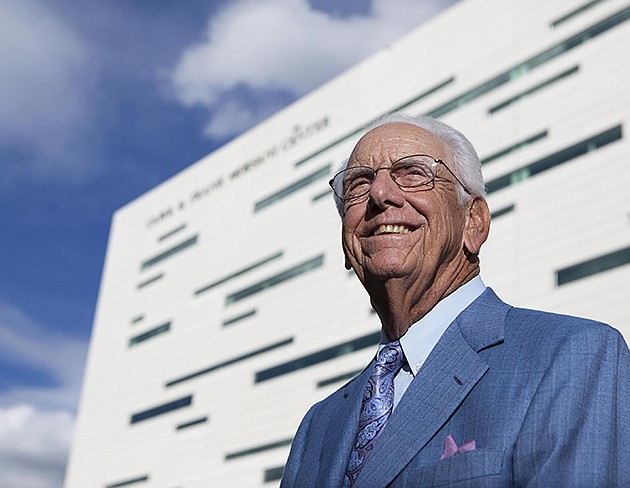Tampa businessman and philanthropist Frank Morsani has had a long and distinguished career, from running 30 auto dealerships to a stint as board chairman for the U.S. Chamber of Commerce.
But it was in 1951, when he was a mechanic on the U.S.S. Antietam in the Korean War, when Morsani learned an integral business lesson that would last the next 60 years: The best kinds of leaders pass responsibility to people down the chain, so everyone, with merit, can have a chance to be the expert of their domain.
Morsani, in a new book he co-wrote, “To Be Frank: Building the American Dream in Business and in Life,” writes that the key is to “pass the responsibility to the lowest common denominator.”
Morsani adds every employee, no matter his role, has to be given a chance to take ownership of tasks and projects. For example, Morsani writes that when he ran his auto business he expected the people who clean the cars to run the supply closet. “The general manager doesn't do that, nor does the service manager,” Morsani writes. “The people in charge of cleaning the cars know what they need — so let them buy the supplies.”
Morsani's company, Tampa-based Automotive Investments, at one point had up to 30 dealerships, with brands from Toyota to Mercedes-Benz. Now 84, Morsani spends most of his days on philanthropic causes, in addition to a few business interests. He and his wife, Carol Morsani, have made significant contributions to a long list of organizations. That includes more than $40 million for USF, for activities that range from helping to bring football to the college to the USF Health Center for Advanced Healthcare; the Straz Center of the Performing Arts in Tampa, where there's the Carol Morsani Hall; and the Dali Museum in St. Petersburg.
Morsani recently sat down with the Business Observer to talk about his career and lessons learned. Here are excerpts of the conversation:
Hard start: Morsani was born in Michigan, but when his father lost his job during the Great Depression the family moved in with relatives in Arkansas, when Morsani was 3 years old. Morsani calls his childhood a “classic portrait of Dust Bowl life in Depression-era America,” where there was no indoor plumbing or electricity. But, Morsani writes, it also included “an abiding sense of optimism that we'd make it through.”
Flexible attitude: Morsani attributes a lot of his success to his ability to accept change. “I have an old saying that change is the only constant in life,” he says. “And we were very open to change in business, but a lot of people aren't. There are a lot of professions closed to change.”
Get around: Management by walking around the office and talking to people came naturally to Morsani, but he thinks it might be somewhat of a lost art today. “In the car business,” Morsani says, “I always told my general managers to come in through the back door and talk to the mechanics and shake their hands before you ever get to the front.”
Be aware: Taking some chances in business enabled Morsani to grow wider and faster. “Being willing to take risks is one of the biggest things you can do to move forward in business,” Morsani says. “Risk is one of the primary things you have to be comfortable with, knowing that there's a downside when you do things.”
Problem solver: The lesson Morsani learned in the Navy about allowing people in your organization to have ownership came up again in the car business. That was in the late 1960s in Fort Lauderdale, when he worked for an executive who later became his mentor, Frank Hardy. Morsani says Hardy was available to talk through an issue, but the young managers were mostly allowed to make decisions on their own. “He would say 'I hired you to solve problems,'” Morsani says, 'not make problems.'”
Management pillars
Frank Morsani, after more than 60 years in business, says he believes people work, for the most part, for four essential things. Those essentials guided how he ran his multimillion-dollar auto sales business. The pillars are:
Respect: “When you respect people,” says Morsani, “they respect you.”
Satisfaction: Morsani says he believes people work for satisfaction, recognition and compensation — in that order.
Recognition: A pat on the back or a few words, says Morsani, go a long way.
Compensation: That's obviously important, but Morsani has found money isn't a driving factor for employees to do well.






